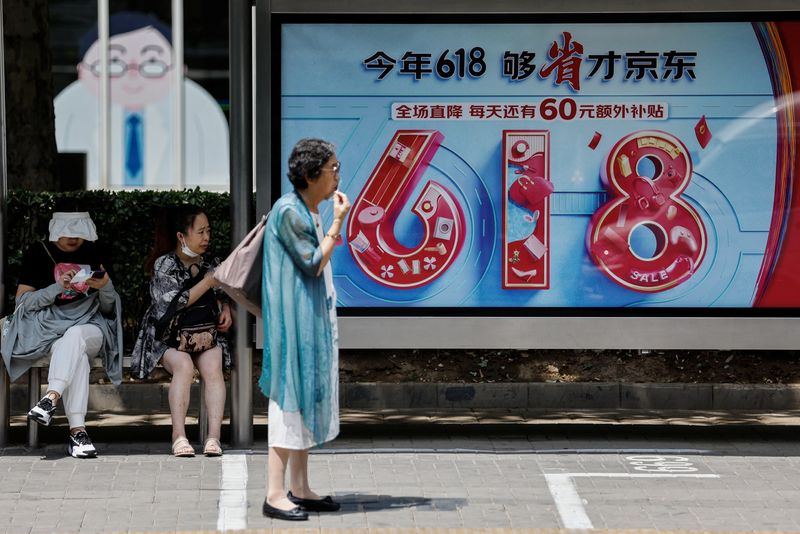By Casey Hall and Sophie Yu
SHANGHAI (Reuters) - China's e-commerce platforms are competing fiercely in the country's first major shopping festival after the pandemic, offering steep discounts to entice frugal consumers in more worrying signs for an economy struggling to build momentum.
The 618 festival, named after the founding date of JD (NASDAQ:JD).com but embraced by all platforms and running from late May until June 18, is a key test of household consumption appetite, vital to bring China's growth on a sounder footing.
This year, JD.com, Tmall, Pinduoduo (NASDAQ:PDD) and others are investing billions of yuan in subsidies and incentives to keep gross sales growing, in what analysts interpret as subdued confidence among the platforms and shoppers.
This bodes ill for China's post-pandemic recovery, which is already losing steam. Retail sales growth in May slowed from the previous month, missing forecasts.
In 2022 China's online retail sales amounted to 13.8 trillion yuan ($1.93 trillion), according to Ministry of Commerce data. Official data also underscored the importance of the broader retail sector, which had overall sales of 44 trillion last year, nearly a third of the country's annual economic output.
"There's all these massive incentives between platforms to fight for market share during the event, which has spoiled everyone rotten," said Josh Gardner, CEO of Kungfu Data, which operates online stores for brands including G-Star Raw and Moschino.
"Everyone's making excuses but at the end of the day, it's a super-soft retail market."
JD.com launched a "10 billion in subsidies" campaign in March. The company said those would take various forms, including advertising discounts for merchants, but did not disclose further details such as the exact size of subsidies offered during the 618 event.
Trudy Dai, group CEO of Taobao Tmall Commerce, the China e-commerce arm of Alibaba (NYSE:BABA)'s newly restructured company, said a "historically huge investment" would be made to acquire customers during 618.
On Tmall, shoppers get an automatic 30 yuan discount for every 200 yuan spent, or 50 yuan back for every 300.
Pinduoduo distributed 5 billion yuan ($697 million) in coupons in the May 30-June 3 pre-sales period, state media reported. It did not respond to a request for comment.
"The fact that all big e-commerce players are focusing their message around discounts really shows the consumer is more conscious about spending money," said Jason Yu, greater China managing director of market research firm Kantar Worldpanel.
Yu and other analysts predict daily necessities and skincare would outperform other product categories this 618 as consumers, worried about the job market, their future incomes and the value of their flat, hold tight to their wallets.
"I bought cat litter, cat food, and some Oolong tea for my husband, but these are things I buy routinely. This 618 I will spend the least money out of any year," said 38-year-old Iris Zhang, who works for an electronics firm in Beijing.
LUXURY ON SALE
Luxury brands, which normally avoid associating themselves with sales periods, are joining the discount race this year as they need to clear inventory, market researchers say.
Analytics firm Re-Hub said brands like Balenciaga and Burberry have offered unusually deep discounts from the start of the sale period, rather than incrementally increasing discounts throughout the festival.
Apple (NASDAQ:AAPL), struggling to retain market share in China, hosted its first ever livestream shopping event on Tmall for 618, offering rare and temporary discounts on several products.
Burberry, Balenciaga and Apple did not reply to Reuters requests for comment.
Last year, JD.com posted 10% annual growth in total 618 sales, its slowest ever. Other platforms do not routinely publish such figures.
Some market watchers say JD.com may also stop releasing its sales tally after Alibaba Group did not disclose the figures for the Nov. 2022 Singles Day shopping festival.
Jefferies analysts estimate "single digits" growth this year for JD.com and other platforms, while those at Citi estimate JD.com's sales will grow 2-5%, citing cautious consumers and "intensified competition" among platforms and brands.
Gardner of Kungfu Data said the net result of a race for discounts will be negative.

"The platforms have just set themselves up for a problem," he said. "It just sucks the life out of sales for the next three or four months."
($1 = 7.1739 yuan)